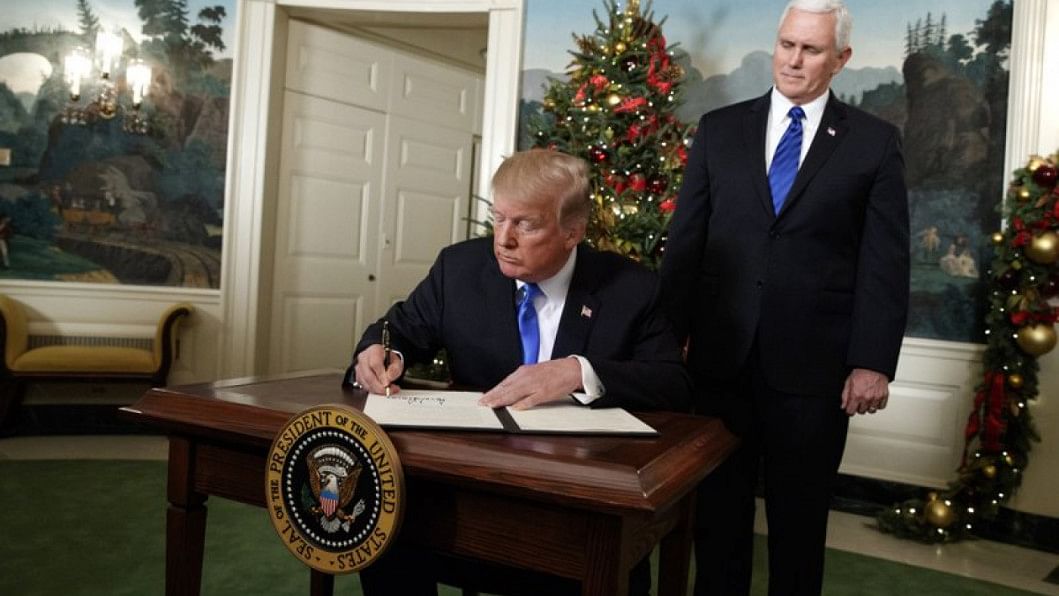Trump’s view on Jerusalem molded by powerful allies

Nearly two years ago, novice presidential candidate Donald Trump was booed by a group of influential Jewish Republicans when he punted a question about whether he backed Jerusalem as Israel’s capital.
On Wednesday, Trump became the first sitting US president to take that position, capping a steady, if unlikely, evolution for a billionaire who had no experience dealing with the perilous politics of the Mideast when he first launched his presidential bid.
Also read: Arabs, Europe, UN reject Trump’s recognition of Jerusalem as Israeli capital
The decision reflects the influence of powerful allies in Trump’s inner circle, including Vice President Mike Pence and Republican mega-donor Sheldon Adelson, men determined to coach Trump on the issue and its importance to conservative Jews and evangelical Christians. It comes despite widespread criticism from allies in the Middle East and Europe, and concerns from some members of his own Cabinet.
“Today we finally acknowledge the obvious: that Jerusalem is Israel’s capital,” Trump said from the White House. “This is nothing more or less than a recognition of reality. It is also the right thing to do. It’s something that has to be done.”
It is not something any other president has followed through on, despite similar campaign promises.
Read more: Jerusalem as Israeli Capital: Trump move stuns world
Trump was drawn to the idea of breaking with that presidential precedent, seeing the chance to issue an order that both his predecessor Barack Obama, a frequent Trump target, and previous Republican presidents were reluctant to issue, according to two advisers familiar with the president’s thinking.
Administration officials are braced for blowback but insisted the move would not upend efforts to forge peace between Israelis and Palestinians. But Trump’s gambit appeared to be driven less by diplomatic strategy and more by the president’s wishes to fulfill a campaign promise that was hard to imagine two years ago.
Appearing before a forum organized by the Republican Jewish Coalition, an influential lobbying group largely funded by Adelson, Trump was asked a delicate, but predictable, diplomatic question: Did he believe Jerusalem was the undivided capital of Israel?
The presidential candidate, who prided himself on candor and straight talk, dodged.
“You know what I want to do? I want to wait until I meet with Bibi,” Trump said, referring to Israeli Prime Minister Benjamin Netanyahu. A smattering of boos erupted from the audience.
But as Trump’s candidacy took off, he began courting pro-Israel American Jews and evangelical Christians. Adelson, a Las Vegas casino magnate, consistently raised the topic in nearly all of his phone calls and meetings with the president, according to a person with knowledge of the Trump team’s thinking.
In 2016, Trump indeed vowed to recognize Israel’s claim to Jerusalem and to move the American embassy there from Tel Aviv, aligning himself with most mainstream Republican presidential hopefuls.
Other influential voices urged Trump to follow through on that promise in the final months of the campaign and after the election, including Pence. The person familiar with the Trump team’s thinking also called David Friedman, who worked as a lawyer for Trump before becoming US ambassador to Israel, an “unsung hero” in keeping the process on track.
During the presidential transition, Trump and his advisers discussed making an announcement on Jerusalem and the status of the US Embassy on Inauguration Day or shortly thereafter. One option Trump advisers discussed was converting the US Consulate in Jerusalem into an embassy and having Friedman work from that post, while keeping the bulk of US officials in the much larger facility in Tel Aviv, according to aides.
But the Trump team backed down amid intense pressure from the State Department and Pentagon, where career officials raised alarms about the prospect that it would inflame the Middle East, according to a person familiar with the discussions. In subsequent months, Secretary of State Rex Tillerson and Secretary of Defense James Mattis continued to urge caution, according to US officials.
The officials, Trump aides and the person familiar with the team’s thinking all insisted on anonymity because they were not authorized to publicly discuss the internal deliberations.
Aides said the issue never fell off the president’s radar. Steve Bannon, his former chief strategist, repeatedly counseled the president to take the step as a means of holding to his campaign promise and energizing evangelical voters. Conservative faith leaders, like Faith & Freedom founder Ralph Reed, also pushed the cause to senior aides.
Wednesday’s announcement was praised by those who have been advocating for White House action.
“This sends a clear message, a very important message, that we will not allow threats of terrorism to determine policy. It’s not just words this time,” said Morton Klein, president of the Zionist Organization of America.
Trump’s decision was immediately denounced by Palestinian Authority head Mahmoud Abbas, who said in a televised statement that the US move “is a declaration of withdrawal from the role it has played in the peace process.”
Trump officials recognised the risks to the peace process, but have made a deliberate calculation that the outrage will blow over and the impact will be limited.
The US officials most heavily engaged in the discussion are Jared Kushner, the president’s son-in-law and senior adviser, and special envoy Jason Greenblatt, who has made multiple trips to the region.
Both Kushner and Greenblatt supported the president’s decision even though they anticipated it would upset the Arab world, according to a White House official. But because the men had already not anticipated presenting a plan until sometime next year, they believe the anger over Jerusalem could subside before negotiations begin, the official said.

 For all latest news, follow The Daily Star's Google News channel.
For all latest news, follow The Daily Star's Google News channel. 








Comments